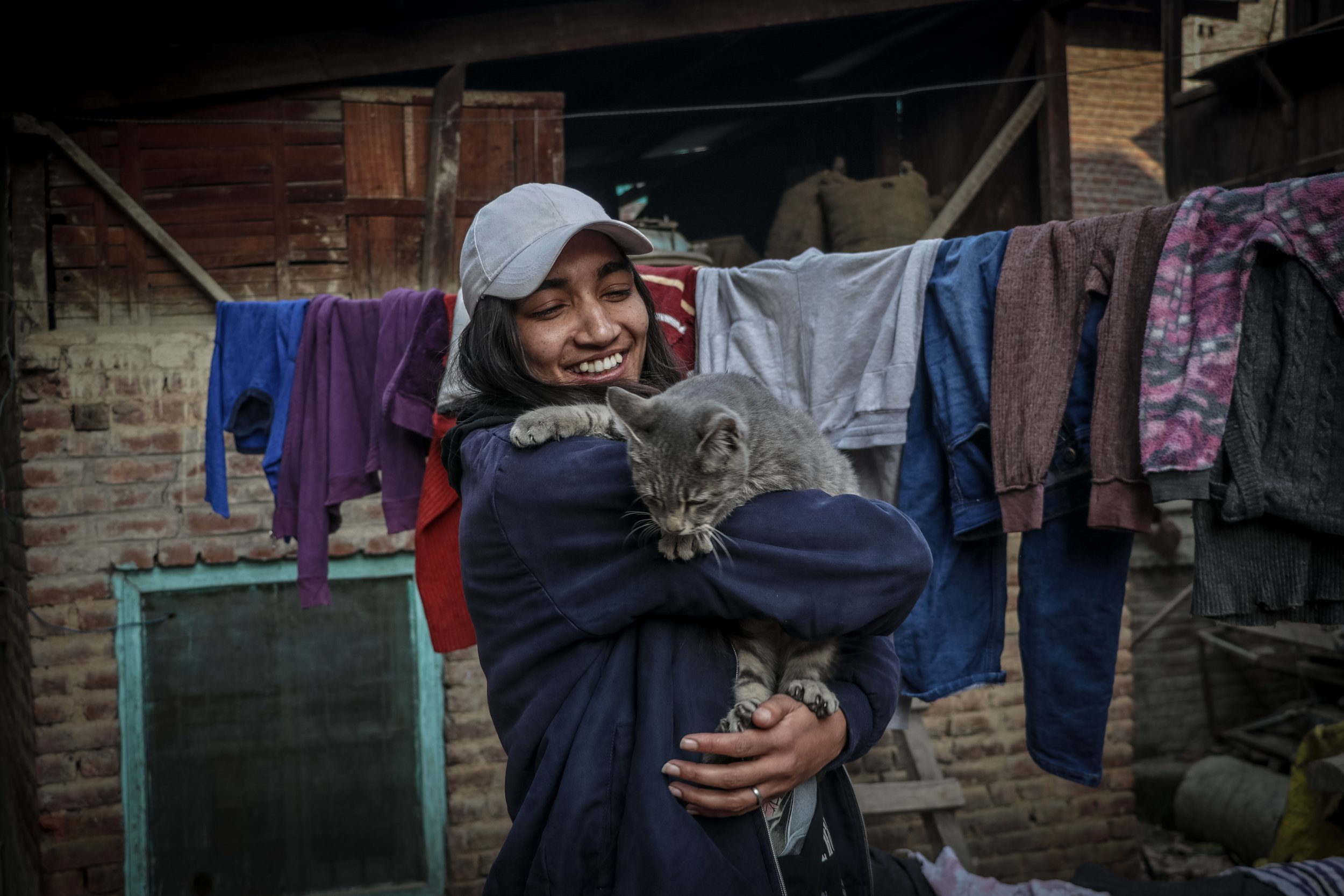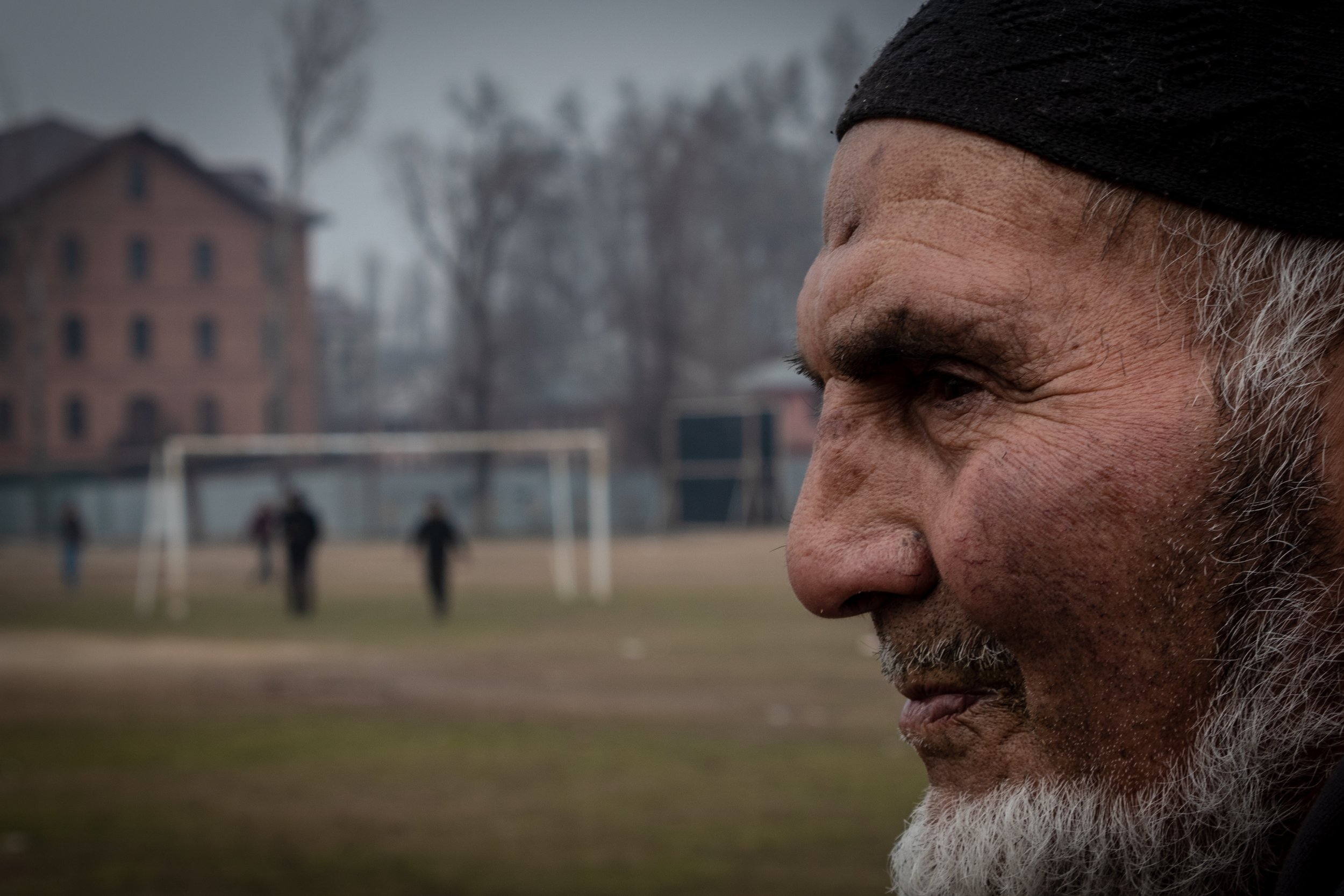Kicking Down Barriers: Coach Champions Women’s Soccer Players in Kashmir
Mohammad Abdullah Dar, 84, born into a middle class family, faced numerous challenges in sports training due to inadequate infrastructure and funding. (Photo by Ashish Kumar Kataria)
On a hazy early morning with an aura of high spirit and enthusiasm, Mohammad Abdullah Dar, 84, wearing a tracksuit and a skull cap, starts jogging in the playground of the Amar Singh College in Srinagar, the capital of Jammu and Kashmir.
Along the way, he passes by young boys and girls who greet him with smiles. Dar’s presence is a a source of inspiration for the younger generation of players in this largely Muslim part of the Indian-administered union territory.
Dar, a fan of the legendary Brazilian soccer legend Pele, developed a passion for the sport at a young age and has dedicated his life to the game after being appointed as coach at the prestigious University of Kashmir, training thousands of youth players in the process.
READ: Muslims Around The World Welcome Ramadan
After retiring from the post, he realized soccer was more than a job, but a love. Recognizing the lack of infrastructure to develop the sport in the region, Dar informally trained athletes for 19 years before establishing a small academy affiliated with the historic Amar Singh College four years ago, training youth players for free.
Once on the field, Dar effortlessly showcases his skills as a player, dribbling past imaginary opponents with grace and finesse. Seeing Dar’s agility and passion for the sport, young boys and girls gather around him, eager to learn. Amid a backdrop fraught with religious and cultural issues, Dar is also known to have given wings to many female players. Among them, he recalled, are two of his most dedicated and talented players, Nadiya Nighat and Afshan Ashiq.
Ashiq, now a 28-year-old goalkeeper at the Premium Indian Football Association in Mumbai, is also the women’s soccer player out of Kashmir. She credited Dar for empowering her and giving her the confidence to pursue her dreams. When discussing the challenges, Ashiq recalled how her parents would refuse to let her attend training sessions, citing the unavailability of female coaches in Kashmir and that her family did not believe girls should play outdoor sports.
“It is like society does not allow women to make their choices, let alone play football, which is considered to be a male sport,” she said. “I was told that it was not the right choice for me to make as a woman. Anything can happen to me; there is no safety in it. What if any body part breaks? Then who will marry me?”
Photos by Ashish Kumar Kataria
Overcoming these norms and expectations in a society that doesn’t allow women the freedom and equality to pursue their dreams, women are confined to traditional roles.
“I was lucky to have an inspiring mentor as my coach, Dar, who had always encouraged and motivated me to play football,” said Ashiq, who recently came to visit her former coach. “He took me to practice sessions with boys and never gave in to the patriarchal and religious norms of our Kashmiri society. He taught me one lesson: I have the right to pursue my goals despite societal expectations or whatever I may face. He polished my skills, and because of him, I became closer to the game and my dreams.”
As he reflected on the rigorous training sessions he had with Ashiq, Dar said, “Talent knows no gender or religion. I saw her dedication and I made it very clear that she had the skills to be a good goalkeeper and could compete at higher levels. I broke the stereotype that women can do better in sports if they are given the wings and opportunities they deserve.”
With a flourishing career and proud parents, Ashiq is encouraged by the growing acceptance from parents who are now willing to send their daughters to training, regardless of whether the coach is male or female. However, she said societal barriers still prevent many girls from pursuing their passion for sports, highlighting the importance of continued efforts to challenge these norms and create equal opportunities for all.
“We need to uplift women through sports that go beyond religion or attire,” she said. “I was often criticized for wearing athletic clothes like half-sleeves or shorts. But I knew if one would start, and another would join the sport that is happening now. I can see parents are willing to send their girls to the training grounds, despite the coach being male or female. There are a lot of girls who want to play, but they cannot because society would not allow so.”
Dar agreed and was optimistic.
“What boys can do, girls can also do,” he addeed. “They are not weak; they are stronger than anyone else.”
Nodding her head in agreement, Ashiq smiled.
“Women have the potential and caliber,” she added. “We are seen as weak, but we are not. We do not need anyone to protect us; we can do that ourselves. I am like my coach Dar. I have developed his traits in me — the stubbornness and passion in me to break the shackles that are put in the way.”
With limited opportunities available for women, Dar stands as a beacon of change for them. At the same time, Ashiq — with a distant vision of inspiring others — said she feels that someday stereotypes will be shattered, fostering a newfound hope and enthusiasm for women's soccer in a region of the world where it is overlooked.
As the sun rises over the Amar Singh College's playground, Dar’s silhouette emerges as a symbol of hope, inspiring a new generation to challenge the status quo. The success of players such as Ashiq, with help from Dar, paints a promising picture of change in Kashmir.
“What boys can do, girls can also do.” Dar’s words resonate with the promise of a brighter, more gender-inclusive sporting landscape in the valleys of Kashmir and beyond.
Ashish Kumar Kataria is a journalist and photographer based out of Haryana, India.
Mohsina Malik is a freelance journalist based in New Delhi, India.





